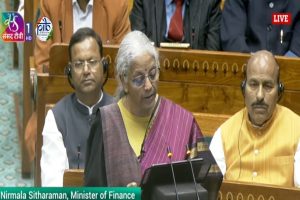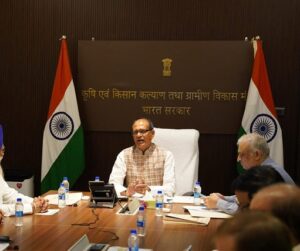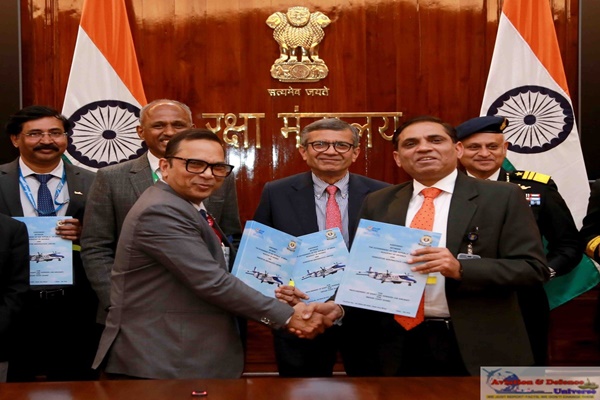
Last Updated on November 19, 2025 5:50 pm by BIZNAMA NEWS
PM Modi Inaugurates South India Natural Farming Summit 2025 in Coimbatore, Calls for a “Science-Backed Natural Farming Movement”
Coimbatore, Tamil Nadu: Prime Minister Narendra Modi on Wednesday inaugurated the South India Natural Farming Summit 2025 in Coimbatore, emphasising that India is poised to become a global hub for natural and chemical-free agriculture. Beginning his address with salutations to Lord Murugan of Marudhamalai, the Prime Minister described Coimbatore as a land representing “culture, compassion, and creativity,” and praised its role as an entrepreneurial powerhouse of South India. He also noted that the city’s textile industry remains one of the major contributors to the national economy.
Referring to Coimbatore’s former Member of Parliament, C.P. Radhakrishnan—now the Vice President of India—Mr. Modi said that the city has earned yet another distinction by contributing leadership at the highest levels of national governance.
India on the Path to Becoming a Natural Farming Hub
Calling natural farming a subject “very close to his heart,” the Prime Minister extended greetings to the farmers of Tamil Nadu, appreciating the participation of agricultural scientists, industry stakeholders, startups, and innovators. He asserted that Indian agriculture is on the brink of major transformation in the coming years, with natural farming expected to occupy a central role.
“India is on the path to becoming a global hub for natural farming,” he declared, adding that young people now view agriculture through the lens of innovation and modern opportunity—an encouraging shift for the rural economy.
Government Support and Financial Empowerment
Highlighting significant improvements in agriculture over the last eleven years, Mr. Modi noted that India’s agricultural exports have nearly doubled. He said the government has expanded every possible avenue to support farmers in modernisation efforts. He pointed out that under the Kisan Credit Card (KCC) scheme alone, farmers have received more than ₹10 lakh crore in assistance this year.
He added that ever since KCC benefits were extended to livestock and fisheries sectors seven years ago, these communities too have been able to fully utilise the scheme. The reduction in GST on bio-fertilisers has also provided a boost to farmers adopting sustainable practices, he said.
From the same platform, the Prime Minister released the 21st installment of the PM-Kisan Samman Nidhi, transferring ₹18,000 crore to farmers nationwide. He said that more than ₹4 lakh crore has so far been directly transferred into the bank accounts of small and marginal farmers, empowering them to meet essential agricultural needs.
Natural Farming: A 21st-Century Necessity
Stressing that the expansion of natural farming is essential for the future of agriculture, Mr. Modi warned against the rising use of chemical fertilisers and pesticides, which are reducing soil fertility and driving up cultivation costs. The way forward, he said, lies in crop diversification and natural farming practices that enrich soil health, protect biodiversity, and shield people from harmful chemical residues.
He noted that the Central Government’s National Mission on Natural Farming, launched one year ago, has already connected lakhs of farmers across the country. In Tamil Nadu alone, nearly 35,000 hectares of land are now under natural and organic cultivation.
Celebrating Indigenous Knowledge
Calling natural farming an indigenous Indian system, the Prime Minister expressed satisfaction that farmers in South India continue to use traditional methods like Panchagavya, Jeevamrit, Beejamrit, and mulching, which improve soil health and reduce input costs. He also emphasised the importance of linking the cultivation of Shree Anna (millets) with natural farming, noting that millets such as Kambu, Samai, Ragi, Sajja, and Jonna have long been a part of the region’s food culture.
The government, he said, is committed to taking millets to global markets and natural farming will play a key role in this mission.
Learning from South India’s Agricultural Heritage
Mr. Modi praised South India as a “living university of agriculture,” pointing to the region’s ancient water management systems, including temple tanks, the Kalingarayan Canal, and historically significant dams. He said South India is well-positioned to lead the next agricultural revolution through natural and sustainable farming.
Calling for collective action, the Prime Minister urged farmers to adopt the “one acre, one season” model to experiment with natural farming and encouraged scientists to incorporate natural farming principles into mainstream agricultural education.
“When traditional wisdom, modern science, and government support come together, farmers will prosper and Mother Earth will remain healthy,” he said.
Summit Background
The South India Natural Farming Summit 2025, being held from 19–21 November, is organised by the Tamil Nadu Natural Farming Stakeholders Forum. The summit focuses on promoting sustainable, regenerative farming models and aims to strengthen market linkages for FPOs and rural entrepreneurs. Over 50,000 participants, including farmers, natural farming practitioners, scientists, and agri-innovators from across South Indian states, are attending the event.








